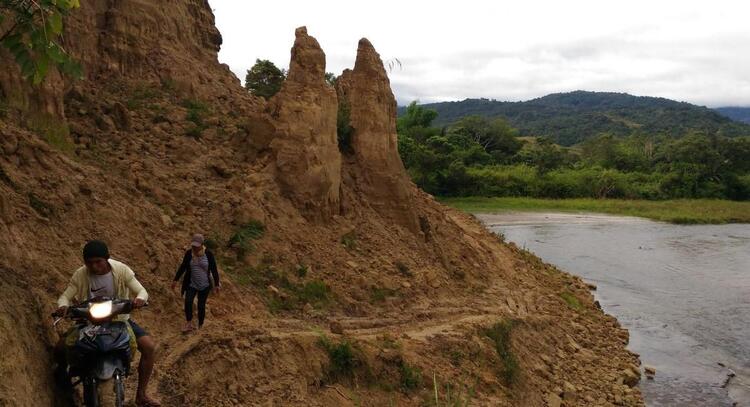About Rampi

Intervillage road in Rampi Subdistrict
Rampi Subdistrict is located approximately at 950 to 1,450 meters above sea level (MASL). It covers an area of 1,565.66 square kilometers (source: Central Bureau of Statistics 2016).
The isolated valley was able to be reached finally using a unique motorcycle taxi by the toRampi, meaning “Rampi people” in Rampi language. In general toRampi are willingful nature conquerors, who are not easily give up to pass through forests, sharp rocks, rushing rivers and steep cliffs.
The road leading to Rampi is impassable by cars, but there are several cars in Onondowa Village. These cars are used mainly to carry local building materials. In addition to cars, there are also rice threshing machines, rice grinders and tractors. Those machines were brought into Rampi area using human power.
Rampi people are very friendly and polite. The highest honor belongs to in-laws and customary law and there is no other higher authority than that.
Another attractive characteristic of the ethnic is their beautiful clothes made skillfully from tree barks. This can be seen in their traditional costumes. There are many more unique things that would realize us about the master arts of God, as reflected throughout the Rampi Valley.
To learn more about the history and the origin of Rampi ethnic group according to the local people, click this link.
Rampi Bible
The word of God in Rampi language, that was translated from 2009 to 2016, is now available. The translation activities were conducted in Napu area, along with other languages team: Bada, Sedoa and Napu, which is better known by the acronym of BASERANA.
The teams were working together and countless number of people has taken part in this translation project.
Rampi Bible is available at below links:
1. Click here to read the web version
2. Click here to download the Android application
3. The printed version is available at Klasis GKST Rampi office in South Sulawesi, and at Klasis GKST Palu office in Central Sulawesi.
JESUS FILM

Jesus film according to Luke has already been dubbed into Rampi language. It was done by Rampi people who live in the Betue Village, Napu Valley, Central Sulawesi. The dubbing process, along with the recording of Rampi songs in video and MP3 format, was held in 2011 in Betue.
Rampi Songs
These Rampi songs are quite popular among Rampi people. The Rampi singers lives in Betue Village, Central Sulawesi.
Click here to watch the videos
Click here for the MP3 version
Liturgy
Liturgical book is used as a guide in various kinds of worships. It was translated from the Book of Worship of the Central Sulawesi Christian Church (GKST).
Liturgical books that have been translated into Rampi language are as follow:
- Liturgical Book I
- Liturgical Book II
- Liturgical Book III
- Liturgical Book IV
- Liturgical Book V
- Liturgical Book for Men Fellowship
- Liturgical Book for Women Fellowship
- Liturgical Book for Youth Fellowship
- Liturgical Book for Elderly Fellowship
- Liturgical Book for Family Worship
- Liturgical Book for Funeral Service
- Liturgical Book for Burial Service
- Liturgical Book for Memorial Service
Click here if you would like to know or learn about how to lead worships in Rampi language.